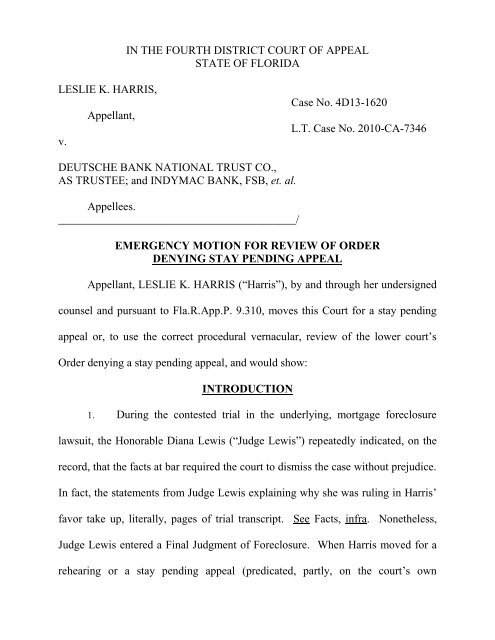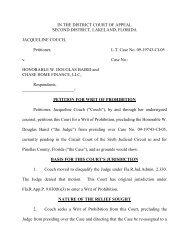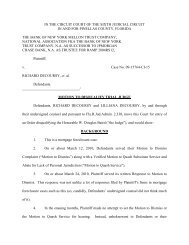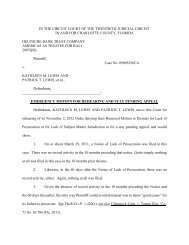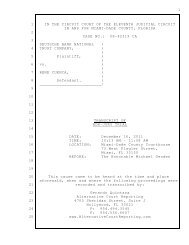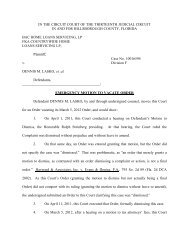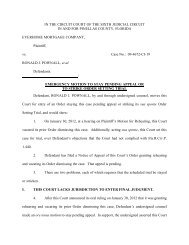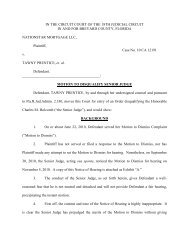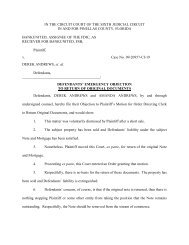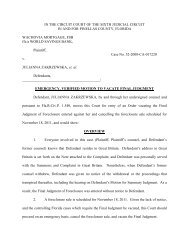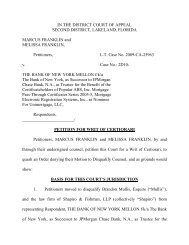Emergency Motion for Stay Pending Appeal - Stopa Law Firm
Emergency Motion for Stay Pending Appeal - Stopa Law Firm
Emergency Motion for Stay Pending Appeal - Stopa Law Firm
You also want an ePaper? Increase the reach of your titles
YUMPU automatically turns print PDFs into web optimized ePapers that Google loves.
IN THE FOURTH DISTRICT COURT OF APPEAL<br />
STATE OF FLORIDA<br />
LESLIE K. HARRIS,<br />
v.<br />
Appellant,<br />
Case No. 4D13-1620<br />
L.T. Case No. 2010-CA-7346<br />
DEUTSCHE BANK NATIONAL TRUST CO.,<br />
AS TRUSTEE; and INDYMAC BANK, FSB, et. al.<br />
Appellees.<br />
__________________________________________/<br />
EMERGENCY MOTION FOR REVIEW OF ORDER<br />
DENYING STAY PENDING APPEAL<br />
Appellant, LESLIE K. HARRIS (“Harris”), by and through her undersigned<br />
counsel and pursuant to Fla.R.App.P. 9.310, moves this Court <strong>for</strong> a stay pending<br />
appeal or, to use the correct procedural vernacular, review of the lower court’s<br />
Order denying a stay pending appeal, and would show:<br />
INTRODUCTION<br />
1. During the contested trial in the underlying, mortgage <strong>for</strong>eclosure<br />
lawsuit, the Honorable Diana Lewis (“Judge Lewis”) repeatedly indicated, on the<br />
record, that the facts at bar required the court to dismiss the case without prejudice.<br />
In fact, the statements from Judge Lewis explaining why she was ruling in Harris’<br />
favor take up, literally, pages of trial transcript. See Facts, infra. Nonetheless,<br />
Judge Lewis entered a Final Judgment of Foreclosure. When Harris moved <strong>for</strong> a<br />
rehearing or a stay pending appeal (predicated, partly, on the court’s own
indications that it needed to dismiss the case and would be reversed by this Court if<br />
it did not do so), Judge Lewis denied that motion and set the first available sale<br />
date – May 29, 2013. 1<br />
2. Harris understands that this Court receives many appeals with<br />
accompanying requests <strong>for</strong> a stay. That said, Harris respectfully submits that the<br />
unique facts at bar justify a stay pending appeal. 2<br />
To wit, and as more fully<br />
explained, infra,: (i) Appellee, Deutsche Bank National Trust Company, as Trustee<br />
(“Deutsche”), lacked standing at the inception of the lawsuit, as the original Note<br />
upon which its standing was based was sitting in a different court file in a different<br />
lawsuit with an entirely different plaintiff at the time this case was filed; and (ii)<br />
the loan history upon which the amounts awarded in the Final Judgment was<br />
predicated was unintelligible, prompting Deutsche’s counsel to submit a colorcoded,<br />
handwritten chart (that was not introduced into evidence), long after the<br />
trial was over. As if that were not indicative enough of a Final Judgment that<br />
should not have been entered, the amount of the Final Judgment included a<br />
sanction imposed against a different plaintiff in a different lawsuit in a case where<br />
Harris prevailed! See Facts, infra.<br />
1 In support of her denial of a stay and setting the first available sale date, Judge<br />
Lewis said only “My job is to move cases.” See Facts, infra.<br />
2 Despite having litigated many hundreds of <strong>for</strong>eclosure cases throughout Florida<br />
since 2008, this is the first time the undersigned has ever felt compelled to seek a<br />
stay pending appeal in a Florida district court of appeal. Suffice it to say that the<br />
filing of this motion, and the titling of it as an “emergency,” is not something<br />
Harris or the undersigned takes lightly.
3. Harris lives in the subject property, is maintaining it, has already paid<br />
off the second mortgage, and was sued <strong>for</strong> mortgage <strong>for</strong>eclosure on the first<br />
mortgage only after the prior holder suddenly stopped applying Harris’ payments<br />
towards her account. Quite simply, unlike many borrowers, Harris can af<strong>for</strong>d this<br />
property. To illustrate, and as a condition of a stay pending appeal, Harris will not<br />
only continue maintaining the property, she will pay all property taxes and<br />
property insurance.<br />
4. On the unique facts at bar, this Court should grant a stay pending<br />
appeal. See Fla.R.App.Pro. 9.310.<br />
FACTS<br />
5. First off, Harris is not what this Court may consider the “typical”<br />
homeowner in a mortgage <strong>for</strong>eclosure case. Harris is not trying to live <strong>for</strong> free. To<br />
illustrate, Harris has already paid off a second mortgage on the subject property, in<br />
full, totaling $110,000. See Appendix to <strong>Emergency</strong> <strong>Motion</strong> <strong>for</strong> Review of Order<br />
Denying <strong>Stay</strong> <strong>Pending</strong> <strong>Appeal</strong> (“Appendix”), 1 (trial transcript), p. 115.<br />
Additionally, Harris paid many thousands of dollars, over a period of years, to the<br />
prior holder of the first mortgage, Indymac Bank, FSB (“Indymac”), even though<br />
she was not the borrower on the subject loan. 3 See Appendix, 1, pp. 115-121.<br />
6. Harris was sued <strong>for</strong> mortgage <strong>for</strong>eclosure only after Indymac held<br />
3 The loan was taken by a close friend of Harris, after which the property was<br />
deeded to Harris, who made the mortgage payments. See Appendix, 5, pp. 115-<br />
123.
Harris’ monies in an escrow account, stopped accepting Harris’ payments, and<br />
randomly returned some payments to Harris without explanation. See Appendix,<br />
1, pp. 115-123.<br />
7. In 2008, Indymac filed a mortgage <strong>for</strong>eclosure lawsuit – not the case<br />
at bar, but on the same property and on the same note and mortgage – Palm Beach<br />
County Case No. 08-CA-12512. See Appendix, 2. That lawsuit was ultimately<br />
dismissed without prejudice. See Appendix, 3.<br />
8. In March of 2010, Deutsche – a totally different entity than Indymac<br />
and an entity which had no involvement in the 2008 lawsuit – filed suit in the case<br />
at bar. See Exhibit, 4. Significantly, Deutsche did not indicate it was suing on<br />
behalf of Indymac, but was suing on its own behalf, as the “own[er] and hold[er]”<br />
of the Note. See Appendix, 4, 5.<br />
9. Deutsche did not attach a copy of the Note to its Complaint,<br />
prompting the lower court to dismiss that Complaint with leave to amend. See<br />
Appendix, 5. Deutsche’s failure to attach the Note to the original Complaint is<br />
unsurprising when one realizes, at the time Deutsche filed the 2010 lawsuit, the<br />
original Note was still sitting in the court file in Indymac’s 2008 lawsuit. After all,<br />
the instant lawsuit was filed in March of 2010, but the Order directing the return of<br />
the original Note in Indymac’s 2008 lawsuit was not entered until September 1,<br />
2010! See Appendix, 4, 6.<br />
10. That bears repeating. At the time Deutsche filed the subject lawsuit,
the original Note was sitting in a totally different court file, initiated by a totally<br />
different, adverse entity, in a totally different lawsuit. See Appendix, 4 (Complaint<br />
in the case at bar, filed March 16, 2010, 6 (Order Directing Clerk to Return<br />
Original Note and Mortgage in Case 2008-CA-12512, entered August 20, 2010).<br />
In fact, it was some six months after Deutsche filed this lawsuit when the original<br />
Note was finally taken out of the court file in Indymac’s 2008 lawsuit and returned<br />
to Indymac. See Appendix, 4, 6.<br />
11. On September 7, 2010 – seven days after the lower court removed the<br />
original Note from the 2008 court file and returned it to Indymac’s counsel –<br />
Deutsche served its Amended Complaint in the case at bar. See Appendix, 7.<br />
Upon amendment, Deutsche again alleged it was the “own[er] and hold[er]” of the<br />
Note and Mortgage. Appendix, 7, 5. Again, Deutsche did not claim it was suing<br />
on behalf of Indymac.<br />
In fact, in this Amended Complaint, Deutsche sued<br />
Indymac, seeking to <strong>for</strong>eclose its interest in the property by virtue of its Notice of<br />
Lis Pendens filed in the 2008 case. See Appendix, 7, 14. This time, though,<br />
having obtained the original Note from the 2008 court file, Deutsche attached a<br />
copy of the Note to its Amended Complaint, with endorsements. See Appendix, 7.<br />
12. Deutsche’s 2010 lawsuit proceeded to trial. During trial and at<br />
closing arguments a few days later, Judge Lewis made it clear this case had to be<br />
dismissed given the many holes in Deutsche’s case. See Appendix, 1, 8. In<br />
addition to the “standing at inception” problem illustrated above, Judge Lewis was
troubled at the lack of any evidence from Deutsche establishing the amounts due.<br />
This led to a bizarre series of events, where trial concluded, closing arguments took<br />
place several days later, and Deutsche’s counsel then submitted a handwritten,<br />
color-coded chart to the lower court which was not in evidence, attempting to<br />
explain the loan history upon which Deutsche tried to rely to support the amounts<br />
due. See Appendix, 9. The problem, of course, was that the loan history was in<br />
evidence, but it was unintelligible, so it could not support the judgment figures<br />
requested by Deutsche. See Appendix, 10. Included below is a sampling of the<br />
lower court’s own statements, on the record, reflecting these problems:<br />
The Court: All right. Here’s what’s going to happen. I’m<br />
going to dismiss this case. You’re going to re-file it. Refile it. You<br />
have pleading problems, okay<br />
* * *<br />
The Court: … These numbers aren’t correct.<br />
[Deutsche’s counsel]: Your Honor, how so<br />
The Court: Because they’re not the ones on the ticker tape, that<br />
he said were accurate. … The numbers don’t match from what you<br />
supposedly handed the witness.<br />
[Deutsche’s counsel]: Your Honor, the witness and I conferred.<br />
The witness is the one who gave me these figures.<br />
The Court: I know, but you didn’t put anything in evidence, or<br />
you didn’t hand it up to me to verify he never used those numbers. …<br />
I bet if you look in the transcript, the numbers aren’t even in there.<br />
[Harris]: They’re not, Your Honor.
[Deutsche’s counsel]: We didn’t testify to the specific<br />
numbers, from my recollection, the specific numbers of this, because<br />
it never actually got that far.<br />
The Court: How do I enter a judgment<br />
[Deutsche’s counsel]: Your Honor, I’d be happy to give you an<br />
affidavit from the witness, that these are the figures that –<br />
The Court: Today is the trial. …<br />
The Court: But there’s been no testimony as to the numbers, is<br />
what I’m telling you. I can go off the payment history, but all these<br />
other charges, I can’t.<br />
…<br />
The Court: And that’s only if I could read the payment history.<br />
The Court: I don’t think he testified to any numbers, is what<br />
I’m saying to you.<br />
[Harris’ counsel]: He did not, Your Honor.<br />
[Harris]: He did not, Your Honor.<br />
The Court: Give me the payment history. I’ll hand you the<br />
payment history. If there’s anything where you can show me a<br />
number that says this is all that’s due and owing, with all the late fees,<br />
et cetera, I’ll be happy to consider it, but, otherwise, you never had the<br />
guy testify. …<br />
The Court: I’ve just never seen anything like this. …<br />
The Court: There’s not a whole lot I can do.<br />
[HOA counsel]: Can we send you proposed judgments, with<br />
the amounts<br />
The Court: There’s no evidence of it. That’s the problem. Just<br />
so you know, whatever I do, just because of that amount, if I picked
any amount that you did, it’s clearly reversible, at the Fourth. There’s<br />
been nothing in the record, to give me numbers. There’s controverted<br />
evidence that she made some payments. …<br />
The Court: You can submit whatever you think is a final<br />
judgment, but it’s going to be very difficult <strong>for</strong> me to even come up<br />
with a number.<br />
Appendix, 1, 8.<br />
13. Notwithstanding the court’s concerns, the court entered a Final<br />
Judgment of Foreclosure. See Appendix, 11. Even upon doing so, the lower court<br />
warned Deutsche’s counsel “if you ever do this again, in this court, it will be<br />
dismissed.” Appendix, 12, p. 17.<br />
14. The court’s own statements aside, perhaps the best illustration of<br />
Deutsche’s failure to prove the amounts owed – and its inclusion of inappropriate<br />
amounts in the Final Judgment – was the inclusion of a sanction entered against<br />
Indymac in the 2008 case. Yes, as part of the Final Judgment, the lower court<br />
awarded Deutsche $359.00, which was characterized on the Final Judgment as a<br />
“litigation cost.”<br />
Appendix, 11, p. 3. Even when Harris explained that this<br />
“litigation cost” was a sanction entered against Indymac and in Harris’ favor as<br />
part of the 2008 case, Appendix, 12, p. 11, the Final Judgment was entered with<br />
this amount anyway.<br />
15. After the undersigned appeared as counsel, Harris moved <strong>for</strong> a stay<br />
pending appeal. See Appendix, 13. The lower court summarily denied that motion<br />
via a written Order (without a hearing). See Appendix, 14. At the post-trial Case
Management Conference, Harris’ undersigned counsel again raised the issue of a<br />
stay, having not been heard on the issue previously. At that point, the following<br />
exchange took place:<br />
Mr. <strong>Stopa</strong>: Judge, you acknowledged yourself, on multiple occasions,<br />
on the record, that, you know -- Initially, you had multiple times<br />
where you said you were ruling <strong>for</strong> the defendant, and then you said if<br />
you didn't, it would be reversed. I'm not arguing with you, but my<br />
point is that I think there are legitimate grounds to go to the Appellate<br />
Court, and be<strong>for</strong>e my client is divested of the property and a third<br />
party purchaser tries to buy it and, potentially, take possession,<br />
ultimately to potentially be removed, then a stay should be entered so<br />
that we can pursue our right on an appeal. We'd be happy to have a<br />
condition in the stay being that my client will continue to maintain the<br />
property, as she has. There won't be any harm to the bank, if we were<br />
to lose the appeal. It simply will have the <strong>for</strong>eclosure sale<br />
rescheduled, once the appeal is over. The collateral is not going<br />
anywhere. So I think a stay is a fair result here, under the<br />
circumstances, so that we can pursue an appeal on these issues.<br />
The Court: You're welcome to do that.<br />
Mr. <strong>Stopa</strong>: Can I submit you an Order that grants a stay<br />
The Court: No. Your stay is denied. ...<br />
Mr. <strong>Stopa</strong>: On the issue of stay, can I ask <strong>for</strong> an explanation, or what<br />
have you, because, you know --<br />
The Court: My job is to move cases.<br />
Mr. <strong>Stopa</strong>: I'm sorry<br />
The Court: My job is to move cases and that's what I'm doing.<br />
Mr. <strong>Stopa</strong>: Okay, and you moved the case by entering a judgment. A<br />
stay doesn't stop you from moving the case, because the judgment will<br />
have been entered. It won't appear as a pending case on the docket,<br />
but it allows us to pursue an appeal.
The Court: May 29.<br />
Mr. <strong>Stopa</strong>: Why are we having a sale date scheduled so quickly Can't<br />
we get --<br />
The Court: Because if you practiced in front of me in this division,<br />
you will have known that 35 days is the most I give, unless there's<br />
extenuating circumstances.<br />
Mr. <strong>Stopa</strong>: I think the extenuating circumstances here are that we have<br />
the issue of the note in the other file, which I know you didn't agree<br />
with, ultimately, and the amount issue. I mean, Judge, those are two<br />
very legitimate things to be appealing about. So I think -- Think about<br />
it from a third party perspective. Do we really want a third party<br />
purchaser to buy this house, when we have an appeal pending, then<br />
they would be divested, when they have done nothing wrong That's<br />
the point of a stay, is it prevents harm to third parties, as well as these<br />
parties.<br />
The Court: Okay. I've ruled. ...<br />
Appendix, 12, pp. 16-19 (boldface added).<br />
appeal.<br />
16. On the <strong>for</strong>egoing facts, Harris asks this Court <strong>for</strong> a stay pending<br />
ANALYSIS<br />
17. In McLean v. J.P. Morgan Chase Bank, N.A., this Court set <strong>for</strong>th a<br />
principal of law that has been oft-cited in mortgage <strong>for</strong>eclosure cases. 79 So. 3d<br />
170 (Fla. 4th DCA 2012). In particular, this Court explained that a <strong>for</strong>eclosure<br />
plaintiff’s lack of standing at the inception of the case could not be cured postfiling,<br />
and the remedy <strong>for</strong> a plaintiff’s lack of standing when it filed suit is to<br />
dismiss the case without prejudice. Id.<br />
18. Since McLean, many Florida courts, including this one, have followed
that same principle of law. Notably, this Court reversed Judge Lewis in Saver v.<br />
J.P. Morgan Chase Bank, N.A., Case No. 4D12-2069 (Fla. 4th DCA, May 15,<br />
2013), earlier this month <strong>for</strong> failing to follow McLean and entering a final<br />
judgment of <strong>for</strong>eclosure where the plaintiff lacked standing at inception.<br />
19. In the case at bar, Deutsche alleged it was the “holder” of the Note.<br />
To be the “holder,” however, Deutsche had to have possession of the original<br />
endorsed note. See Fla. Stat. 671.201(21); Henderson v. Litton Loan Servicing,<br />
LP, 92 So. 3d 301 (Fla. 4th DCA 2012). As “holder” was Deutsche’s claimed<br />
theory of standing, Deutsche was required, under McLean, to have possession of<br />
the original, endorsed note when it filed this lawsuit.<br />
20. As the facts, supra, plainly illustrate, Deutsche did not have<br />
possession of the original Note when it filed this lawsuit. After all, the Note was<br />
sitting in the court file of the 2008 lawsuit initiated by Indymac, where that Note<br />
remained until August 30, 2010 – several months after Deutsche filed suit in<br />
March of 2010. Quite clearly, Deutsche did not prove the requisite standing at<br />
inception. At minimum, Harris has a legitimate basis to appeal this issue, and a<br />
stay pending appeal is appropriate while she does.<br />
21. Additionally, the lower court’s own statements, quoted, supra, show<br />
that Harris has a bona-fide appeal due to the lack of evidence of the amounts due.<br />
As the Third District appropriately explained in reversing a <strong>for</strong>eclosure judgment:
But <strong>for</strong> our determination that the case should have been dismissed in<br />
2009 <strong>for</strong> lack of prosecution, we would also reverse and remand the<br />
final summary judgment because of its patently incorrect<br />
computations of Ms. Spencer's alleged indebtedness. If the interest<br />
accrual dates were to have commenced in 1997 rather than<br />
"November 1, 2007," EMC's motion <strong>for</strong> final summary judgment and<br />
affidavit should have so stated. The final summary judgment<br />
compounds the error by coming to the same incorrect interest figure<br />
while adding an additional year to the computation period.<br />
<strong>Law</strong>yers, no less than clients, need to be handy with a calculator<br />
and give attention to detail if they wish to work on mortgage loan<br />
cases. In a residential loan setting such as this, someone's home is<br />
at stake, and the lien calculation affects redemption rights and<br />
bidding at a later sale.<br />
Spencer v. EMC Mortgage Corp., 97 So. 3d 257 (Fla. 3d DCA 2012) (emphasis<br />
added).<br />
22. Where a plaintiff’s attorney resorts to filing a hand-written, colorcoded<br />
chart that was not in evidence in an attempt to explain an otherwise<br />
unintelligible loan history, responds to the court’s concerns about insufficient<br />
evidence by offering to submit affidavits weeks after the trial was over, and the<br />
trial court includes in a Final Judgment a “litigation cost” entered against a<br />
different plaintiff in a different lawsuit, the problems are obvious.<br />
23. Harris understands that our courts have a backlog of <strong>for</strong>eclosure cases.<br />
However, where a judge’s only stated reason <strong>for</strong> denying a stay is that her “job is<br />
to move cases,” then, respectfully, something is amiss. The fact that this Court just<br />
reversed Judge Lewis on this same legal issue – standing at inception in a<br />
<strong>for</strong>eclosure case, see Saver, supra – is also indicative of a problem. Respectfully,
a judge’s stated objective of “mov[ing] cases” should not be elevated to a level that<br />
a Final judgment of Foreclosure is entered even though Deutsche clearly lacked<br />
standing at the inception of the case.<br />
24. The lower court is a court of law. The law must be followed. The<br />
rules of evidence, likewise, must be followed. Is Harris, the lower court, or this<br />
Court supposed to take counsel’s word <strong>for</strong> it that the handwritten notes and color<br />
codes match up with the items listed on the payment history Is this Court With<br />
all due respect, this is what trials are <strong>for</strong> – to present evidence and allow factfindings<br />
based on the evidence presented. Final Judgments in Florida courtrooms<br />
are not based on color-codes and handwritten notes provided <strong>for</strong> the first time after<br />
trial.<br />
25. Harris is confident that her appeal in this cause will be meritorious.<br />
That argument, though, is <strong>for</strong> another day. For now, this Court should grant a stay<br />
pending appeal, ensuring the <strong>for</strong>eclosure sale does not proceed on May 29, 2013 as<br />
scheduled.<br />
26. The prejudice to Harris if she is <strong>for</strong>eclosed and ultimately prevails on<br />
appeal is enormous. She will be in the impossible position of being dispossessed<br />
from her homestead and <strong>for</strong>ced to live elsewhere, only to be allowed to return<br />
months later.<br />
The prejudice to innocent third parties is likewise significant.<br />
Candidly, it would be awful if an innocent third party purchases this property at a<br />
<strong>for</strong>eclosure sale only to then be <strong>for</strong>ced to leave because Harris prevailed on appeal.
27. Conversely, the prejudice to Deutsche if a stay is granted is negligible.<br />
Harris is maintaining the home and will continue to do so while an appeal is<br />
pending. In the event Harris does not prevail on the appeal, the property will still<br />
be there <strong>for</strong> Deutsche to <strong>for</strong>eclose. The sale can simply be rescheduled and<br />
Deutsche will have lost nothing. Harris’ willingness to pay property taxes and<br />
property insurance while the appeal is pending – as a condition of the stay – reflect<br />
her good faith and show that Deutsche will suffer no harm by a stay.<br />
28. In light hereof, this Court should grant a stay pending appeal,<br />
allowing Harris to pursue her appellate rights without fear of a <strong>for</strong>eclosure sale.<br />
<strong>for</strong>egoing.<br />
WHEREFORE Harris respectfully requests relief in accordance with the<br />
CERTIFICATE OF SERVICE<br />
I hereby certify that a true and correct copy of the <strong>for</strong>egoing has been<br />
furnished via email to Cassandra Racine-Rigaud, Esq., Morris, Hardwick &<br />
Schneider, at MHSinbox@closingsource.net and Donald K. Corbin, Esq., at<br />
doncorbinlaw@hotmail.com on this 23rd day of May, 2013.<br />
______________________________<br />
Mark P. <strong>Stopa</strong>, Esq.<br />
FBN: 550507<br />
STOPA LAW FIRM, P.A.<br />
2202 N. West Shore Blvd, Suite 200<br />
Tampa, FL 33607<br />
Telephone: (727) 851-9551<br />
ATTORNEY FOR APPELLANT


